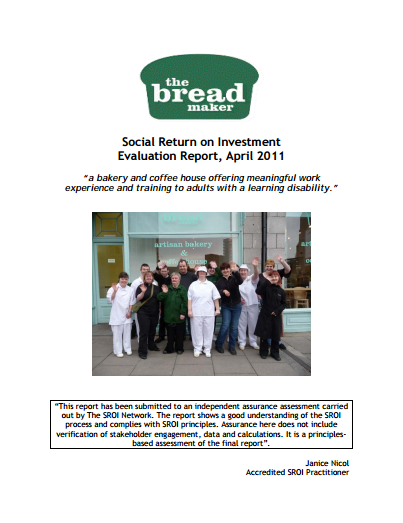Reports Database:
The Breadmaker SROI

The bread maker is an exemplary emerging Social Firm operating in Aberdeen City; a commercially focused enterprise producing high quality breads and confectionery. The purpose of their business activities is to provide a range of meaningful employment, training, educational opportunities and social activities to Adults with Learning Disabilities who are excluded in mainstream society.
The ethos of the bread maker is that of fully supporting and enabling Apprentices to work in a holistic and innovative way, offering a stimulating and positive experience to each individual, valuing and recognising their contribution and input as a team player within their thriving bespoke business.
The Apprenticeship Scheme offers 24 adults with learning disabilities a range of work experience and job opportunities within a dedicated bakery unit and welcoming coffee house – 12 of the apprentices work in the bakery and 12 work in the coffee house. Additionally they are supported to fully participate in the life of the city and engage in a range of social activities and learning opportunities out-with their job requirements. A continuous personal development programme ensures that everyone has the opportunity to maximise their own potential to become a fully active member of society valued for their abilities, skills and experience.
The bread maker has invested in undertaking an evaluative Social Return on Investment (SROI) analysis and the scope of this analysis focuses on the bread maker’s Apprenticeship Scheme during the financial year April 2009 – March 2010. This one year of the Apprenticeship Scheme was made possible by the £58,615 contract for Support Services from Aberdeen City Council.
The principles of SROI were used as a framework to support the evaluation exercise and a range of stakeholders were identified and fully engaged with during the whole process. The focus was on measuring the changes that are brought about in the lives of those affected by the Apprenticeship scheme – in particular the key stakeholders, 24 Apprentices working in the bakery and/or Coffee House. Additional stakeholders included, Volunteers, Parents and Key Workers, NHS and Local Authority Representatives. A range of methods were used to engage with stakeholders to capture information and evidence to fully support any findings.
In society, work is widely recognised as having a huge impact on people’s wellbeing and health and as such the bread maker strives to make this a reality for adults who would otherwise be denied the opportunity of having a real job within a real business.
The changes that have been experienced by all the stakeholder groups have been captured and recorded within the SROI report. There is a wealth of positive change reported amongst all stakeholders including; huge levels of increased confidences, increased levels of independence, skills attainment, and knowledge, a feeling of being valued in society and improved health and wellbeing. In particular Apprentices engaging in the bread maker are much healthier, happier people contributing more fully to society.
The bread maker is reported by the Local Authority as offering a stimulating experience and deeper integration into everyday life for adults with a learning disability who otherwise may be at home and/or possibly on their own. The bread maker is the foremost positive destination as a Learning Disability Service provider; it provides a positive place for people to go to work in an empowering environment.
The range of training and work experience offered by the Apprentice Scheme enhances efforts to increase an individual’s capabilities and personal development and the bread maker is a great example of the type of service needed. The provision of the rewarding experience of working in the successful business, that is the bread maker, is far more preferable than only offering adults the alternative option of spending their week doing arts and crafts.
The bread maker is a ‘fit for purpose’, progressive and sustainable organisation, that is professional and proactive in its approach to business on all levels of service and product delivery. The detailed impact map developed captures the key outputs and outcomes measured as determined by the scope of the evaluation. The impact and supporting documentation provides detailed information on what financial proxies have been used, sources of evidence and values attributed against each outcome. Calculations have also been made to ensure that the true value of impact has been recorded.
The comprehensive evaluation and study has resulted in an SROI calculation ratio in £4.50 of added value for every £1.00 of investment made by Aberdeen City Council through their Service Level Agreement. (Under sensitivity analysis, this ratio would reduce to £4.25).
